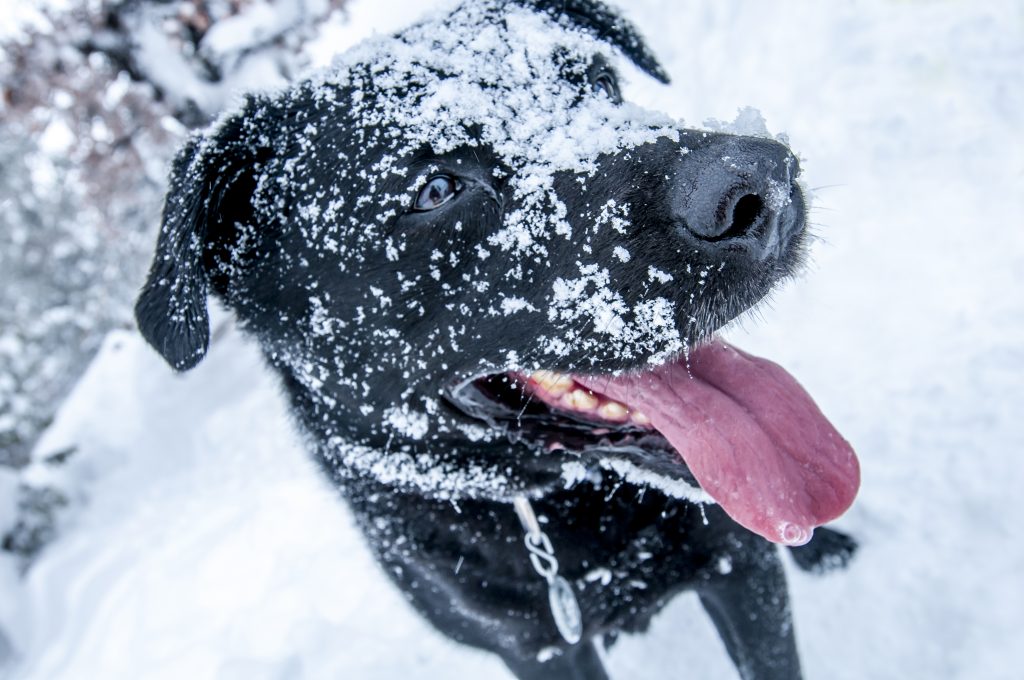Winter Pet Safety Tips
 As fall turns to winter and temperatures start to drop, let’s revisit the essential winter pet safety tips. Keeping your pets safe during the icy months is crucial for their comfort, health, and overall well-being.
As fall turns to winter and temperatures start to drop, let’s revisit the essential winter pet safety tips. Keeping your pets safe during the icy months is crucial for their comfort, health, and overall well-being.
Protection from the Elements
Winter weather is no laughing matter here in Colorado, and the safest and most comfortable place for your pet is indoors with you. These are the top winter pet safety tips:
Tolerance for Cold Weather
Long-haired or thick-coated dogs are generally more tolerant of cold but can still be at risk in chilly weather. Short-haired pets feel the cold more quickly due to less insulation, while short-legged pets may get cold faster as their bellies and bodies are more exposed to the snow-covered ground.
Stay Inside
All pets, regardless of breed or size, should be kept indoors during the cold winter months. Always bring your pet inside when temperatures fall below freezing (32°F) to keep them safe and warm.
Frostbite and Hypothermia
As with humans, pets can get frostbite and hypothermia. And, because their foot pads are exposed, they are especially vulnerable to cracking and bleeding, as well as slipping on snow and ice. Use protective snow booties to keep your pet’s feet warm and dry. They come in various types and sizes. A protective coat or sweater can provide additional protection from the cold when outdoors for walks and potty breaks. Shorthaired breeds, as well as very young or old pets, may need extra layers to keep warm.
Cold-Weather Breeds
For dogs that tolerate cold weather well and enjoy being outdoors, like Huskies or Malamutes, ensure they have a warm, comfortable shelter that protects them from the elements. Make sure they have access to fresh, unfrozen water while outdoors.
Rock Salts
Rock salts and deicers are toxic and irritating for your pet’s skin and paws, so be sure to wash or wipe your pet’s paws and belly after walks. This is another reason to provide a protective coat or sweater and booties.
Antifreeze and Pets
Each year, thousands of pets die due to antifreeze poisoning. Antifreeze contains ethylene glycol, a dangerous and potent toxin to pets. Its sweet odor and taste make it irresistible to many pets, but even a small amount can cause kidney failure if ingested.
Pets are more likely to be exposed to antifreeze in the winter than in the warmer months, so practicing safety in this area is a must. Keep your pets safe from antifreeze this winter by:
- Supervising pets at all times while outdoors
- Cleaning up antifreeze spills immediately
- Storing unused antifreeze out of your pet’s reach
- Switching to a pet-friendly brand of antifreeze
If you suspect that your pet has ingested antifreeze, seek medical attention for him or her immediately. Prompt treatment will greatly increase your pet’s chance of survival.
Watch that Winter Weight
The cold weather and holiday festivities can mean missed walks and playtime for our four-legged friends, leading to winter weight gain and its associated health concerns. Make a commitment to keeping your pet in tip-top shape this winter with the following ideas for winter exercise:
- Don’t let the cold and snow slow you down. Get out there and walk or play with your dog anyway!
- Play indoor games such as, “hide-and-seek” and “tug-o-war”, or hide a favorite toy or treat in another room and play “find it”.
- Obedience training, agility classes, and obstacle courses provide exercise and mental stimulation for dogs of all ages and abilities.
- Provide exercise and interest for indoor cats with the use of cat trees, laser pointer or feather chase games, or even a wadded up newspaper or an empty box.
Questions or concerns about winter pet safety? Don’t hesitate to contact the team at Lone Tree Veterinary Medical Center.



